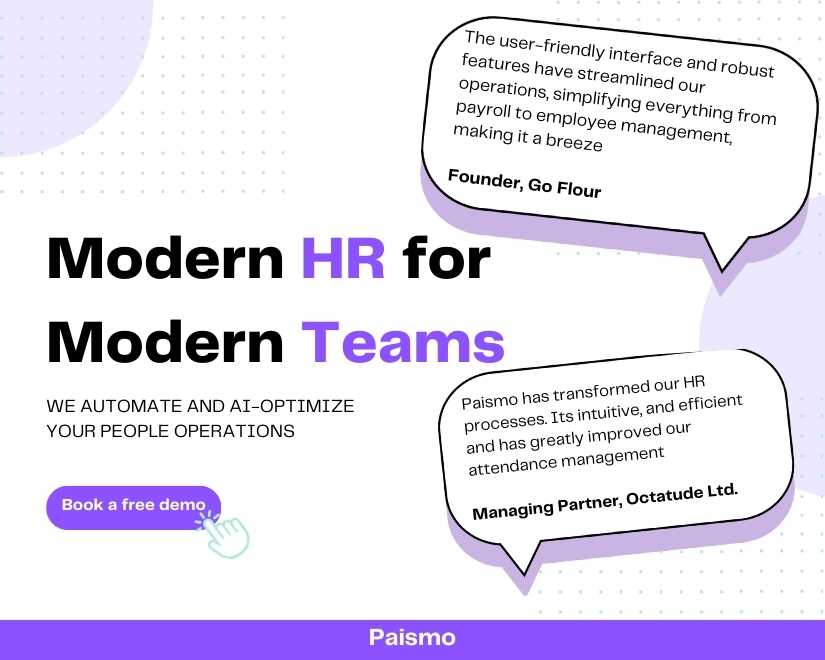Highlights
- Self-evaluations help employees reflect on achievements, address challenges, and set future goals for career growth.
- Strong self-evaluation sample answers highlight strengths, problem-solving, teamwork, communication, and leadership skills.
- Managers gain insights into employee performance, engagement, and development, making better decisions and setting aligned goals.
- Common mistakes include being too vague, focusing only on weaknesses, or looking backward without planning for growth.
Managing performance reviews is an important part of employee growth. A good self-evaluation helps employees reflect on their progress and share their goals clearly. However, many people struggle to find the right words. That is why simple guidance and self-evaluation sample answers can make the process easier. With the right approach, companies can build a culture of feedback and growth.
In today’s workplace, tools like HR software in Pakistan and modern HCM systems also support this process. This guide will show you the best examples of how to write strong evaluations confidently.
What Is a Self-Evaluation?
A self-evaluation is a structured review that helps employees assess their performance, progress, and contributions over a set period, usually a quarter or a year. It allows them to reflect on achievements, recognize new skills, and see how their efforts support the organization. This makes it a meaningful way to measure personal growth and workplace impact.
Self-evaluations also allow employees to share insights that managers may not observe in daily work. This reflection strengthens communication and builds trust. When used well, self evaluation answers samples promote impactful employee engagement and support long-term career development.
How to Write an Effective Self-Evaluation?
A self-evaluation is a chance to highlight your achievements, reflect on challenges, and set goals for growth. The key is to be clear, honest, and specific so your manager understands your progress. Here’s how to structure it effectively:
- Highlight Your Strengths
Share the skills and qualities that help you perform well at work. Explain how they improve results, support your team, and show your value.
Example: “I maintain strong time management by meeting deadlines while helping teammates with urgent tasks.”
- Reflect on Accomplishments
Point out your main achievements and describe their impact. Use numbers or results to make them clear and easy to measure.
Example: “I created a new process that reduced project delays by 15% and improved overall team efficiency.”
- Address Challenges Honestly
Be open about the challenges you faced and how you solved them. This will prove that you can adapt, learn, and keep improving.
Example: “I initially struggled with delegating tasks, but improved by assigning responsibilities more clearly to teammates.”
- Set Clear Future Goals
End with your career goals and explain how you plan to achieve them. Mention how tools and workflows, supported by HR technology, can help you grow while adding value to the company.
Example: “I plan to complete a leadership training program for future management roles.”
21 Employee Self Evaluation Sample Answers
For HR managers and leaders, it can be challenging to identify what makes a strong self-assessment. Here are 21 examples for evaluation that highlight different areas of performance. Each can guide employees in writing effective self-evaluation sample answers goals, while showing managers clear insights into strengths and growth.
Here are some self evaluation sample answers that highlight different strengths and qualities employees can use when reflecting on their performance:
Self-Awareness Examples
- I make it a point to ask for feedback to keep improving at work.
- I recognize my strengths and stay focused on addressing areas where I can grow.
- I regularly reflect on my skills to see what needs development and where I can add more value.
Conflict Resolution Examples
- I approach conflicts calmly and look for fair solutions that work for everyone.
- Whenever misunderstandings arise, I encourage open conversations to clear the air quickly.
- I mediate when needed, helping the team move forward with a positive mindset.
Work Ethic Examples
- I always aim to meet deadlines and keep my work reliable.
- Even when tasks pile up, I stay committed and take initiative to get things done.
- I also ensure that my work reflects the values and standards of the company.
Time Management Examples
- I organize my tasks based on meeting deadlines without sacrificing quality.
- When managing several responsibilities, I stay structured and avoid wasting time.
- Over time, I continue refining my planning skills to become even more productive.
Problem-Solving Examples
- I approach problems with a focus on finding practical and lasting solutions.
- When challenges appear, I break them down, analyze them, and look for the best path forward.
- I also learn from each situation so I can improve my problem-solving skills.
Integrity Examples
- I believe in staying honest and professional in every situation at work.
- If I make a mistake, I am transparent and take responsibility for fixing it.
- I build trust with colleagues and managers by following through on my commitments.
Leadership Examples
- I guide my colleagues by sharing support and offering mentorship when needed.
- I lead through actions, showing commitment and helping to build a positive team spirit.
- I also take the initiative to encourage team members in their growth and development.
8 Benefits of Self-Evaluations for Managers and Employees

Self-evaluations are more than a performance tracking tool. They help managers understand their teams better and allow employees to reflect on their strengths and areas for growth. They also build stronger communication, improve engagement, and support career development. Many companies now include self-evaluations in their performance suite to enhance efficiency and deliver greater employee benefits.
For Managers
- Improve performance: Self-evaluations allow managers to see how employees view their progress, making it easier to guide improvements and encourage growth.
- Boost engagement: By opening clear communication between managers and employees, self-evaluations create a stronger sense of involvement and accountability.
- Support better decisions: Self-assessment insights help managers understand team strengths, identify gaps, and assign the right people to the right projects.
- Set practical goals: Self-evaluations highlight employee ambitions and skills, making aligning personal goals with company objectives easier.
For Employees
- Increase self-awareness: Reflecting on performance helps employees clearly see their strengths and weaknesses, encouraging personal and professional growth.
- Identify learning goals: Self-evaluations highlight areas for development, allowing employees to set meaningful training and learning objectives.
- Build confidence: Recognizing achievements during self-reflection reassures employees of their value and motivates them to keep improving.
- Open growth opportunities: Self-evaluations often identify gaps and needs and lead to targeted training, mentorship, and career advancement.
Common Mistakes to Avoid In Self-Evaluations
Employees often make avoidable mistakes in self-evaluations that can limit their effectiveness. Below are the most common ones to watch out for:
- Being Too Vague or Generic
General statements like I worked hard and contributed to team projects do little to showcase actual value. Instead, highlight measurable results, such as leading the automation of reporting workflows that reduced manual effort and improved accuracy. Referring to self-evaluation sample answers can help employees frame their contributions more effectively.
- Over-Explaining Weaknesses Without Solutions
While acknowledging challenges demonstrates self-awareness, focusing only on shortcomings without an action plan can appear unproductive. For instance, rather than saying I struggled with project management and missed a deadline, a stronger approach is to mention the challenge and describe the steps taken to improve, such as adopting a task management system or completing a training workshop.
- Only Looking Backward Instead of Forward
Self-evaluation should not stop at past performance. Along with achievements, it is important to outline future goals, areas for development, and plans to build on existing strengths. This forward-looking approach demonstrates a commitment to continuous growth and positions employees for greater opportunities.
Summary
Writing effective self-evaluations is key to employee growth and stronger workplace communication. They help highlight achievements, address challenges, and set future goals that align with organizational success.
With the proper structure and support from self-evaluation sample answers, employees gain confidence in reflecting on performance while managers get clearer insights for better decisions and team development.
Become a part of the Paismo community
Paismo is an HR software that can help simplify your HR operations. In today's dynamic economic environment, efficient HR and automated payroll management are no longer a luxury but a necessity. Paismo is a comprehensive solution that transforms traditional HR complexes into streamlined and automated workflows. Paismo and its paired biometric device integration can be used for your business to mark employee attendance and record their timesheets accurately.
Paismo simplifies your tasks with its core HRMS, timesheets, and attendance management, as well as biometric attendance, payroll automation, and leave management system.

Take the first step toward modernizing your HR and payroll processes and explore what Paismo can do for you. Book a demo with our sales team.








